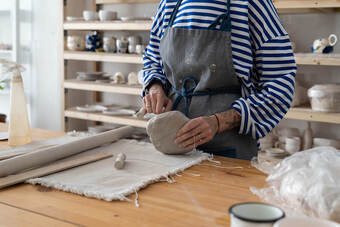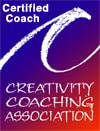|
Creatives, I can’t get over how the universe works in cycles and patterns. Part of the magic of my job is to vicariously experience, like a fly on the wall, so many different walks of life- I truly feel the magnitude of the gift of hearing your stories. It is from my third person perspective that I see cycles emerge- patterns of high and low energies, trends in struggles and successes, commonalities in content and themes. I am in awe and amazement of the beautiful intricacies of life that unite the human experience. Time and again I watch people who don’t and will probably never know each other struggle together, succeed simultaneously and seek the same insights at the same time. I find myself giving the same models, theories or suggestions in bursts, to be immediately followed by a fresh wave of commonalities. And so again this week- I bring you a theme that has been a focus lately in the Creatively rooms. I trust to the ebb and flow of the universe that it is timed well for your journey. Tools for Creative People: Spoon TheoryToday’s topic is our innate psychological capacity to handle stress. There are many ways to conceptualize this- but by far my favorite is commonly called “spoon theory.” Imagine a psychologist at a restaurant with her psychologist friends, trying to describe a phenomenon she has observed in her work. She has noticed that the ability to take on stress is finite- each individual seems to have a unique threshold. She scoops up spoons from nearby tables and lays them down in front of her- representative units of stress management. She postulates that each part of our lives takes a certain number of spoons- some more than others- and when all spoons are in use (being “out of spoons”) you are in trouble. She suggests that psychological illnesses represents a certain number of spoons (depression, anxiety, bipolar) other psychosocial factors of life represent others (medical problems, financial worries, jobs, relationships). Freeing Your Spoons: Making Space for Creativity Her theory has many other facets, and also isn’t presented without solution- she also recommends activities that “free up spoons.” These are your personal recharging strategies- some of them fairly universal- a good night’s sleep, good nutrition, good activity levels, being around good and supportive people. Other strategies are more personalized- (read: individual coping skills), “me” time for introverts, “others” time for extroverts, “creative” time for creatives, and more. The short answer here is you are in need of your own personal cocktail of spoon- freeing things, and part of your regular self awareness should be checking in with and improving the effectiveness of this recipe. Stuck? Create More. Let’s take this theory and apply it to our creative process. I have said before that creativity necessitates giving of ourselves (see creative personality posts) and therefore- takes spoons. We also talk about creative flow of energy, being in the creative zone- this happens when we have enough spoons. In a creative rut? You guessed it-possible explanation: out of spoons. The other thing to remember is you are caught in a feedback loop a bit here: creating takes spoons, but it also frees up your spoons. I suppose this just proves what I regularly say to the creative people I work with: creative people need to be creating to stay well. Feeling stuck? Create more. Feeling low in energy? Create more. Yes- that first push will take spoons- so do other “spoon-freeing” activities to generate some initial energy- but if you are creating regularly you can be in your own self-sustaining cycle of spoon maintenance. Spoon Theory: Simple, Yet PowerfulThis is simple language to start a conversation ultimately about balance and psychological self care and use of resources in your life. Come sit on my couch and let explore. Interested in More Psychology for Creative People? Research in Psychology (including my own!) has begun to identify the important and unique features of Creative People and their personalities. This is so important when learning to care for yourself as a Creative Person in the world and live well. Ready to learn more about yourself as a Creative Mind, and what that means? Try one of these three things, today: 1) Schedule a free individual consultation for creative people 2) Get started with creativity counseling 3) Get started with creativity coaching More Articles Like "Tools for Creative People, Spoon TheoryGrants for Artists, Creative People and Abandonment, Intense Pressure for Creative People, Creative People and the Urge to Shop, Creative People Who Don't Know Who They Are, Concierge Counseling for Creative People, Creative People with Headaches and Stomach Aches, Creation Translation, Crisis of Meaning: Creative People Lost References:
https://familyandchildtherapy.com/2019/11/07/how-the-spoon-theory-can-help-us-put-a-fork- in-poor-communication-and-self-care/ Miserandino, Christine (2003). "The Spoon Theory". But You Don't Look Sick. Archived from the original on 17 November 2019. Retrieved 5 July 2017 Comments are closed.
|
get more from The Creativity CoursesLiking educational topics and knowing what's hot in creativity? Creatively has online courses, with an interactive creative community, coaching sessions and more in the Creativity Courses. Want these blogposts in a newsletter? Subscribe here, and get a free gift. Cindy Cisnerosis a Creativity Coach, Creative Therapist and Professional Artist in Sykesville, Maryland. She is an expert straddling the realms of arts, creativity research, psychology, therapy, and coaching. She provides Online Creativity Counseling in Maryland and Virginia, and Online Creativity Coaching throughout the USA, Canada and the UK tailored for the discerning, imaginative, artistic, and neurodiverse. The information provided in this blog is from my own clinical experiences and training. It is intended to supplement your clinical care. Never make major life changes before consulting with your treatment team. If you are unsure of your safety or wellbeing, do not hesitate to get help immediately.
Archives
July 2024
|
|
Concierge Therapy for Creatives in Maryland
Creativity Coaching Worldwide including the USA, UK and Canada |
Telephone |
|

 RSS Feed
RSS Feed

